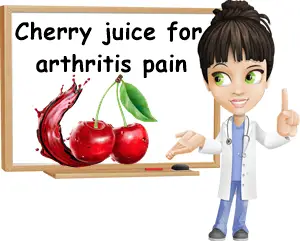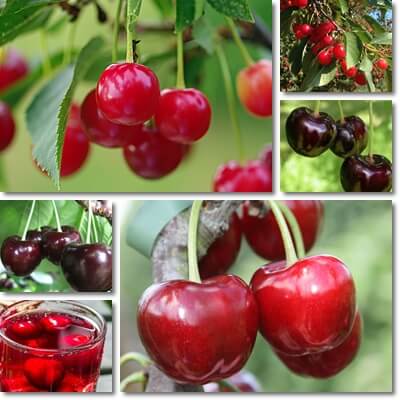Cherries and cherry juice have scientifically proven benefits for arthritis joint pain. Eating sweet or sour cherries or drinking cherry juice every day lowers inflammation in the body and reduces joint swelling and pain in arthritis, improving joint flexibility, mobility and functionality. Studies show sweet and especially tart cherries and cherry juice have strong anti-inflammatory properties, comparable to the pain-relieving effects of some NSAIDs such as ibuprofen and naproxen.
Regular consumption of the fruit or fruit juice reduces inflammation markers in the body, including C-reactive protein and COX-1 and COX-2 enzymes, nitric oxide, Interleukin 6 and 8 and tumor necrosis factor-alpha. The anti-inflammatory, anti-arthritic benefits of cherries and cherry juice are primarily provided by pigmented antioxidants known as anthocyanins.

What is arthritis?
Arthritis is a general term designating several conditions characterized by inflammation that causes visible swelling of the joints and pain. Depending on the type of arthritis, symptoms typically also include joint stiffness and reduced range of movement, but also redness, warmth or a burning sensation in the affected joint/s, loss of flexibility, difficulty moving or using the affected joint/s and even deformity in osteoarthritis, rheumatoid arthritis or gout.
Arthritis mainly affects the joints and areas around the joints, most commonly the joints of the fingers, toes, wrists, ankles, knees, hips, lower back and neck. But some forms of the disease (e.g. lupus) can affect other organs too and cause systemic side effects that include fatigue, muscle weakness, disability (e.g. not being able to use the hands, losing balance or the ability to walk), mental health problems and sleep problems.
Cherries for arthritis pain
Cherries are a known and effective anti-inflammatory food whose effects are scientifically proven. Eating cherries for arthritis pain is proven to reduce inflammation in the body which, in turn, reduces swelling in the affected joints and associated pain. The benefits of regular cherry consumption for arthritis extend to include improved mobility and use of the affected joints, but also improved mental health and quality of life as well as better sleep (also see the benefits of cherries and cherry juice for sleep).
How are cherries good for arthritis pain?
How exactly do cherries help with arthritis pain? What makes cherries, and cherry juice, good for arthritis pain is their strong anti-inflammatory properties. Anthocyanin antioxidants in cherries have important anti-inflammatory effects, inhibiting multiple inflammation pathways with benefits for inflammatory conditions such as osteoarthritis, rheumatoid arthritis and gout (also see the benefits of cherries and cherry juice for gout).
Strong anti-inflammatory effects have been observed in all colors of sweet and tart cherries and their juice, however, most studies appear to be favoring tart cherries and tart cherry juice for their anti-inflammatory benefits, as well as black cherries over red cherries.

(1) Anti-inflammatory anthocyanins
The bulk of the anti-inflammatory benefits of cherries and cherry juice are owed to pigmented antioxidants known as anthocyanins. Anthocyanins are responsible for the color of red and black cherries and cherry juice. One of the ways that anthocyanins in cherries and cherry juice help with arthritis pain is by reducing inflammation markers in the body contributing to arthritis symptoms. This translates into reduced joint swelling and associated pain, as well as improved joint flexibility, better functionality and overall better quality of life.
In a study, sweet cherries of the Bing variety were shown to lower blood circulating concentrations of several inflammation markers in healthy men and women. The subjects ate 280 g of cherries a day for 28 days and results showed a reduction in the following inflammatory markers: C-reactive protein (decreased by 25%), regulated upon activation, normal T-cell expressed, and secreted (RANTES) (decreased by 21%) and nitric oxide (decreased by 18%).
In another study, anthocyanin antioxidants in sweet and sour cherries were shown to inhibit two inflammatory enzymes: the cyclooxygenase 1 (COX-1) enzyme and the cyclooxygenase-2 (COX-2) enzyme.
In a study on the effects of cherries on gout, cherries and cherry juice and extract lowered inflammation markers such as Interleukin 6, Interleukin 8, tumor necrosis factor alpha and the cyclooxygenase-1 and cyclooxygenase-2 inflammatory enzymes.
In another study, anthocyanins present in sour cherries (e.g. cyanidin) showed COX inhibiting effects comparable to NSAIDs such as ibuprofen and naproxen 10 μM concentrations, which further accounts for the benefits of cherries and cherry juice consumption for arthritis joint pain.
In an animal study, anthocyanins extracted from tart cherries suppressed inflammation-induced pain behavior in rats, leading researchers to the conclusion that cherry anthocyanins may hold benefits for the treatment of inflammatory pain such as arthritis pain. In another animal study, sour cherry juice obtained from the Prunus cerasus Maraska variety exhibited in vivo antioxidant effects and inhibited the inflammatory enzyme known as COX-2 (cyclooxygenase-2 enzyme), revealing both antioxidant and anti-inflammatory properties.
(2) Anti-inflammatory Quercetin
Quercetin is a flavonoid antioxidant occurring naturally in many foods, including sweet and sour or tart cherries, but also sorrel and red onions. Studies show quercetin is a strong anti-inflammatory agent with benefits for inflammatory conditions such as arthritis.
Eating fruits high in quercetin such as tart cherries or drinking tart cherry juice can help reduce inflammation markers such as tumor necrosis factor alpha, Interleukin 1 beta, cyclooxygenase-1 (COX-1) and cyclooxygenase-2 (COX-2) (source).
By reducing inflammation in the body, quercetin contributes to benefits for arthritis such as reduced joint swelling, decreased joint circumference, reduced joint pain and improved joint functionality.
While both sweet and tart cherries are good sources of quercetin, the latter are noted as having a higher content of quercetin, making tart cherries and tart cherry juice a good food to eat for arthritis joint pain.
(3) Other anti-inflammatory components
Cherries, and cherry juice, are further good for arthritis joint pain thanks to their vitamin C content: 7 mg of vitamin C/100 g of sweet cherries from commercial production vs 10 mg of vitamin C/100 g of tart cherries from commercial production.
Although they aren’t the best food source of vitamin C, regular consumption of the fresh fruit and juice contributes to daily requirements of the vitamin, adding to the fruit’s benefits for arthritis pain. Vitamin C is known for its strong anti-inflammatory and antioxidant properties, as well as immune system-modulating activity. However, more recent research suggests a minimum daily intake of 500 mg of vitamin C is needed to enjoy visible benefits, including cardiovascular benefits, benefits for allergies and asthma, a stronger immune system response and benefits for arthritis-related swelling and pain.
Sweet vs tart cherries for arthritis
Both sweet and tart cherries have real benefits for the treatment of arthritis pain. However, according to existing data, tart cherries may just be slightly better for arthritis and inflammatory conditions in general.
Studies indicate tart cherry varieties are generally higher in all anti-inflammatory components, including total phenolics, anthocyanins, quercetin, vitamin C and other biologically active components (compared to sweet cherries). However, if you only have access to sweet cherries or sweet cherry juice for arthritis pain management, then know it’s still a good option to consider.
Black cherries vs red cherries for arthritis
Black cherries are essentially darker-colored varieties of red cherries. Both red and black cherries owe their color and most of their health benefits to pigmented antioxidants known as anthocyanins (see the benefits of black cherries).
Anthocyanins are responsible for red, blue, purple and black colors in fruits and vegetables.
The general rule is: the darker the food, the more anthocyanin antioxidants it has. Because they are darker-colored, it stands to reason that black cherries have more anthocyanin antioxidants than red cherries. And since studies reveal that anthocyanins are the primary source anti-inflammatory benefits of sweet and tart cherries, it is reasonable to assume that black cherries are better for arthritis than red ones.
However, if you only have access to red cherries or yellow cherries, then know that these are good options too. The bottom line is: eating cherries on a regular basis, whether sweet or sour, or drinking cherry juice is likely to provide quantifiable anti-inflammatory benefits and visible effects for managing arthritis joint pain.
